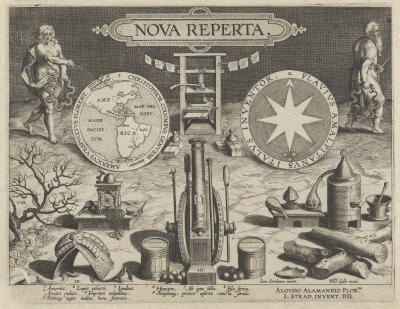
Beginning with an in-depth look at Johannes Stradanus's Nova Reperta, explore the interplay between invention, social change, and economic development from the Renaissance to today.

Beginning with an in-depth look at Johannes Stradanus's Nova Reperta, explore the interplay between invention, social change, and economic development from the Renaissance to today.
A forum held online in collaboration with the Newberry Library on June 18th, 2020.
What is the relationship between technological change and economic development? Do the roots of the 'knowledge economy' lie in sixteenth century Europe? Explore these issues and more beginning with an in-depth look at Johannes Stradanus's Nova Reperta [ca. 1590], an engraved series of prints depicting inventions such as the printing press, gunpowder, and guaiacum, a plant used to treat syphilis. Join our speakers as they discuss the relationship between local and global knowledge, the role of collaboration for invention, and the positive and negative impacts of new technology over the past five centuries.
Join us for a conversation with Lia Markey, Director of the Center for Renaissance Studies at the Newberry Library, Paula Findlen, the Ubaldo Pierotti Professor of Italian History at Stanford University, and Joel Mokyr, the Robert H. Strotz Professor of Arts and Sciences and Professor of Economics and History at Northwestern University.
Technology Then and Now is presented in collaboration with the Newberry Library and its exhibition Renaissance Invention, open August 28, 2020–November 25, 2020.
Questions or comments about this event or others like it? Let us know.

Paula Findlen is the Ubaldo Pierotti Professor of Italian History and Co-Director of the Suppes Center for the History and Philosophy of Science and Technology at Stanford University. Professor Findlen's research focuses on the early history of science and medicine, particularly in Renaissance Italy. She is the author of Possessing Nature: Museums, Collecting, and Scientific Culture in Early Modern Italy and editor of Empires of Knowledge: Scientific Networks in the Early Modern World, among many other works.

Lia Markey is the Director of the Center for Renaissance Studies at the Newberry Library in Chicago. Dr. Markey's research examines cross-cultural exchange between Italy and the Americas in the sixteenth and seventeenth century, collecting history, and early modern prints and drawings. She is the author of Imagining the Americas in Medici Florence and co-editor of The New World in Early Modern Italy, 1492-1750.

Joel Mokyr is the Robert H. Strotz Professor of Arts and Sciences and Professor of Economics and History at Northwestern University. He studies the economic history of Europe, specializing in the early modern and modern periods. His recent research has been concerned with the understanding of the economic and intellectual roots of technological progress and the growth of useful knowledge in European societies, as well as the impact that industrialization and economic progress have had on economic welfare. He has published widely, including A Culture of Growth: Origins of the Modern Economy (Princeton University Press, 2016) which won the Alan Sharlin Prize of the Social Science History Association. He serves as editor in chief or the Princeton University Press books series on Economic History.
The Consortium's collections provide many opportunities to learn more about the history of technological and economic development.
Our cross-instiutional search tool allows researchers to investigate materials across multiple institutions from a single interface. With more than 4.4 million catalog records of rare books and manuscripts, the Consortium's search hub offers scholars and the public the ability to identify and locate relevant materials.
Anthony F.C. Wallace Papers, American Philosophical Society
Eugene Shallcross Ferguson Papers, Hagley Museum and Library
Biographical and bibliographical dictionary of the Italian humanists and of the world of classical scholarship in Italy, 1300-1800, American Philosophical Society
Papers [ca. 1940s], relating to Filarete, American Philosophical Society
Early Modern Things: Objects and their Histories, 1500-1800, edited by Paula Findlen; Routledge, 2013.
Empires of Knowledge: Scientific Networks in the Early Modern World, edited by Paula Findlen; Routledge, 2018.
The New World in Early Modern Italy, 1492-1750, edited by Elizabeth Horodowich and Lia Markey; Cambridge, 2017.
Captured Objects: Inventories of Early Modern Collections, edited by Jessica Keating and Lia Markey, Journal of the History of Collections, 2011.
A Culture of Growth: The Origins of the Modern Economy, by Joel Mokyr; Princeton, 2018.
The History of Technological Anxiety and the Future of Economic Growth: Is This Time Different?
The Contribution of Economic History to the Study of Innovation and Technical Change: 1950-1914
The Natural Science of the Biblical World in Late Renaissance Italy, Andrew Berns
Cures from New Worlds: the Portuguese Tropics and the Origins of the Global Drug Trade, 1640-1760, Benjamin Breen
Jewish Midwives, Medicine and the Boundaries of Knowledge in Early Modern Europe, 1650-1800, Jordan Katz
Homo-Musicus: The Early Modern Sciences of the Human Body, Edward Barnet
© 2026 Consortium for History of Science, Technology and Medicine | Copyright Infringement
Watch this page for expert commentary coming soon.